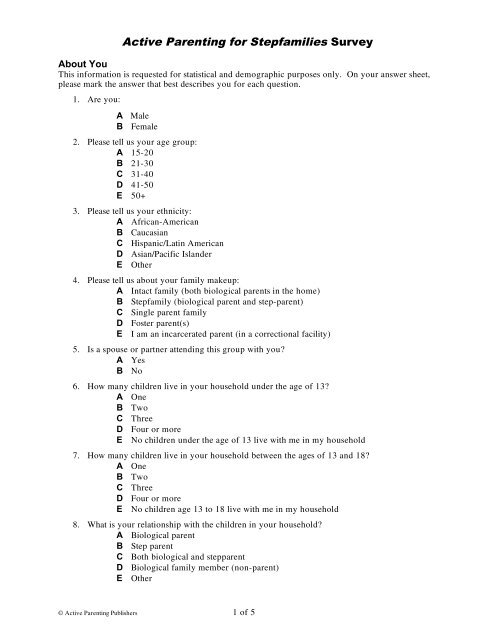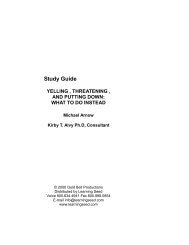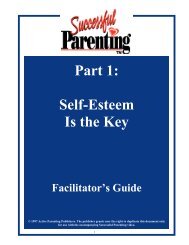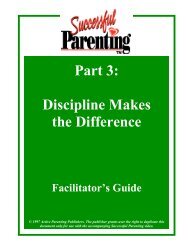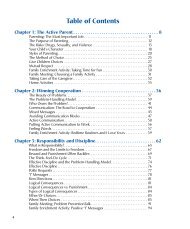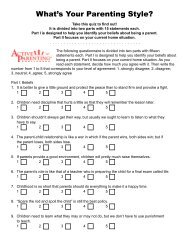Active Parenting for Stepfamilies Survey - Active Parenting Publishers
Active Parenting for Stepfamilies Survey - Active Parenting Publishers
Active Parenting for Stepfamilies Survey - Active Parenting Publishers
Create successful ePaper yourself
Turn your PDF publications into a flip-book with our unique Google optimized e-Paper software.
<strong>Active</strong> <strong>Parenting</strong> <strong>for</strong> <strong>Stepfamilies</strong> <strong>Survey</strong><br />
About You<br />
This in<strong>for</strong>mation is requested <strong>for</strong> statistical and demographic purposes only. On your answer sheet,<br />
please mark the answer that best describes you <strong>for</strong> each question.<br />
1. Are you:<br />
A Male<br />
B Female<br />
2. Please tell us your age group:<br />
A 15-20<br />
B 21-30<br />
C 31-40<br />
D 41-50<br />
E 50+<br />
3. Please tell us your ethnicity:<br />
A African-American<br />
B Caucasian<br />
C Hispanic/Latin American<br />
D Asian/Pacific Islander<br />
E Other<br />
4. Please tell us about your family makeup:<br />
A Intact family (both biological parents in the home)<br />
B Stepfamily (biological parent and step-parent)<br />
C Single parent family<br />
D Foster parent(s)<br />
E I am an incarcerated parent (in a correctional facility)<br />
5. Is a spouse or partner attending this group with you?<br />
A Yes<br />
B No<br />
6. How many children live in your household under the age of 13?<br />
A One<br />
B Two<br />
C Three<br />
D Four or more<br />
E No children under the age of 13 live with me in my household<br />
7. How many children live in your household between the ages of 13 and 18?<br />
A One<br />
B Two<br />
C Three<br />
D Four or more<br />
E No children age 13 to 18 live with me in my household<br />
8. What is your relationship with the children in your household?<br />
A Biological parent<br />
B Step parent<br />
C Both biological and stepparent<br />
D Biological family member (non-parent)<br />
E Other<br />
© <strong>Active</strong> <strong>Parenting</strong> <strong>Publishers</strong> 1 of 5
<strong>Active</strong> <strong>Parenting</strong> <strong>for</strong> <strong>Stepfamilies</strong> <strong>Survey</strong><br />
9. Please tell us your highest degree of education:<br />
A Some High School<br />
B High School Diploma<br />
C Some College<br />
D Undergraduate Degree<br />
E Graduate Degree<br />
10. Please tell us your average household yearly income (optional)<br />
A. Under $40,000<br />
B. $40,000 to $80,000<br />
C. Above $80,000<br />
Parent <strong>Survey</strong> Questions<br />
Please read each statement below. Circle the letter on the answer sheet that corresponds with how<br />
much you agree or disagree with the statement. As you think about each statement, please do not try<br />
to look <strong>for</strong> a “right” answer—we want to know what you think.<br />
A<br />
Strongly<br />
Disagree<br />
B<br />
Disagree<br />
C<br />
Neutral<br />
D<br />
Agree<br />
E<br />
Strongly<br />
Agree<br />
11. Most remarried couples bring some “emotional baggage” with them from previous relationships<br />
that can get in the way of creating a strong stepfamily.<br />
12. Children in a stepfamily need to heal from past losses.<br />
13. Stepparents must be willing to discipline their stepchildren from the start or they won’t be taken<br />
seriously.<br />
14. A stepparent should not contradict a biological parent in front of the children.<br />
15. Becoming a strong stepfamily should not take more than a year.<br />
16. Stepchildren should adjust to the way things have always been done in their new stepfamily.<br />
17. The couple relationship is the foundation of a strong stepfamily.<br />
18. Stepparents should never acknowledge to their stepchildren that this is a new and challenging<br />
situation <strong>for</strong> them<br />
19. The strongest bond in a stepfamily is between the parent and his or her biological child.<br />
20. Love between a parent and stepchild usually takes a long time to develop.<br />
21. It is okay if stepchildren never love their stepparents as long as they respect them.<br />
22. Family meetings often create unnecessary conflict in a stepfamily and should be avoided.<br />
23. The parents should handle conflicts in a stepfamily in no uncertain terms.<br />
24. Step brothers and sisters can work out issues around sexuality <strong>for</strong> themselves.<br />
25. A good way to teach a child positive life lessons and help him or her adapt to stepfamily life is to<br />
point out the mistakes made by his or her non-custodial biological parent.<br />
26. When the time is right, the biological parent should <strong>for</strong>mally transfer the authority to discipline<br />
to the stepparent.<br />
27. The commitment of both parents (biological and step) is equally important to stepfamily success.<br />
28. All things considered, stepfamilies are pretty much like intact families.<br />
© <strong>Active</strong> <strong>Parenting</strong> <strong>Publishers</strong> 2 of 5
<strong>Active</strong> <strong>Parenting</strong> <strong>for</strong> <strong>Stepfamilies</strong> <strong>Survey</strong><br />
29. If a remarried couple truly loves each other, the children will love their new stepparents almost<br />
immediately.<br />
30. One of the myths of stepfamily living is that kids sometimes get “caught in the middle” of<br />
grown-up conflicts.<br />
The next set of questions is about your child. Select the child or teen (biological or stepchild) that<br />
you are the most concerned about. Then, using the scale below, circle the letter on the answer sheet<br />
that best describes how often that child or teen does each behavior.<br />
A<br />
Almost<br />
never<br />
B<br />
Sometimes<br />
C<br />
Not sure<br />
D<br />
Often<br />
E<br />
Almost<br />
always<br />
31. My child demands too much attention from me.<br />
32. My child follows my directions.<br />
33. My child becomes upset if he/she makes a mistake.<br />
34. My child is truthful.<br />
35. My child quits or gives up on tasks be<strong>for</strong>e completion.<br />
36. My child bosses others.<br />
37. My child complains about things not being fair.<br />
38. My child expresses anger in an appropriate manner.<br />
39. My child shows respect <strong>for</strong> others.<br />
40. My child expresses affection toward me.<br />
41. My child cooperates with me.<br />
42. My child is willing to try new things.<br />
43. My child blames others <strong>for</strong> his/her own mistakes.<br />
44. My child likes him/herself.<br />
45. My child says hurtful things to me.<br />
46. My child talks with me about concerns and asks questions.<br />
47. My child spends a lot of time by him/herself.<br />
48. My child encourages others.<br />
49. My child enjoys spending time with me.<br />
50. My child enjoys spending time with the whole family group.<br />
© <strong>Active</strong> <strong>Parenting</strong> <strong>Publishers</strong> 3 of 5
<strong>Active</strong> <strong>Parenting</strong> <strong>for</strong> <strong>Stepfamilies</strong> <strong>Survey</strong><br />
Please read each statement below. Then, using the scales below, circle the letter on your answer sheet<br />
that best describes how often you do this.<br />
A<br />
Rarely<br />
B<br />
About once<br />
a month<br />
C<br />
About once<br />
a week<br />
D<br />
A few times<br />
a week<br />
51. I take time out to play or do something fun with my child.<br />
52. I give my child responsibilities around our home.<br />
53. I give my child choices.<br />
54. I express affection to my child in a thoughtful and creative way.<br />
55. I encourage my child in a sincere and specific way.<br />
E<br />
Every day<br />
56. I take a "time out" to relax and clear my mind (<strong>for</strong> example: take a hot bath, read, talk to a<br />
friend, take a walk).<br />
A<br />
Almost<br />
never<br />
B<br />
Rarely<br />
C<br />
Sometimes<br />
D<br />
Often<br />
57. I say “please” to my child when I ask her to do something.<br />
58. I yell at my child when I am angry.<br />
59. I help my child solve his own problems.<br />
60. I give in to my child’s demands to avoid a fight or to keep her happy.<br />
61. I give my full attention to my child when he talks to me.<br />
62. I use a logical consequence when she does something wrong.<br />
E<br />
Almost<br />
always<br />
63. I offer my child rewards such as money or toys to get him to do what I want.<br />
64. I explain what behavior I expect from my child in a specific situation (<strong>for</strong> example, going to the<br />
grocery store).<br />
65. I monitor my child's activities, including TV, movies, music, and the Internet, choice of friends,<br />
and activities outside the home.<br />
66. I am able to influence my child’s behavior without yelling, spanking, or threatening.<br />
67. I let my child participate in decisions that affect the family.<br />
A<br />
Never<br />
B<br />
Once or<br />
twice a year<br />
68. I hold family meetings.<br />
C<br />
Several times<br />
a year<br />
69. I discuss our family’s values with my child.<br />
D<br />
Once every<br />
couple of weeks<br />
E<br />
About once<br />
a week<br />
70. I talk to my child about the negative effects of alcohol, tobacco, and other drugs.<br />
© <strong>Active</strong> <strong>Parenting</strong> <strong>Publishers</strong> 4 of 5
<strong>Active</strong> <strong>Parenting</strong> <strong>for</strong> <strong>Stepfamilies</strong> <strong>Survey</strong><br />
About This Course (to be answered following the last session)<br />
Circle the letter on the answer sheet that corresponds with how much you agree or disagree with the<br />
statement.<br />
A<br />
Strongly<br />
Disagree<br />
B<br />
Disagree<br />
C<br />
Neutral<br />
D<br />
Agree<br />
E<br />
Strongly<br />
Agree<br />
1. I found this course to be helpful.<br />
2. Our stepfamily has grown stronger since I began this course.<br />
3. My children’s behavior has improved since I began this course.<br />
4. I would recommend this course to a friend.<br />
© <strong>Active</strong> <strong>Parenting</strong> <strong>Publishers</strong> 5 of 5


